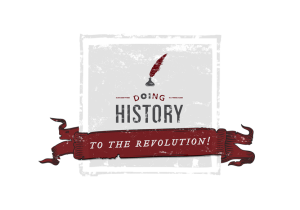Essentially, sound is a pressure wave that causes vibrations as it displaces and moves the air around it, which our ear drums pick up and our brains interpret. The human brain gathers and infers a LOT of information through sound because sound waves carry a lot of clues about the physical properties or events that created them. For example, if someone drops an object on the floor, the sound waves that come from the object striking the floor tell our brains about the kind of surface the object hit as well as the physical properties of the object—its approximate size, weight, material, and shape.
Writing Early American History with Sound
 On April 18, 2017, a new preview episode of the Doing History: To the Revolution! series will post on Ben Franklin's World. It will be my most creative episode yet because it tells a story and uses sound to enhance the story I'm telling. The Omohundro Institute posted a piece I wrote about thinking through how to use sound to convey history on it's blog, Uncommon Sense.
I've been thinking a lot about horses. Specifically, what a Narragansett Pacer mare would have sounded like galloping on a dirt road in mid-April in the dead of night.[1]
On April 18, 2017, a new preview episode of the Doing History: To the Revolution! series will post on Ben Franklin's World. It will be my most creative episode yet because it tells a story and uses sound to enhance the story I'm telling. The Omohundro Institute posted a piece I wrote about thinking through how to use sound to convey history on it's blog, Uncommon Sense.
I've been thinking a lot about horses. Specifically, what a Narragansett Pacer mare would have sounded like galloping on a dirt road in mid-April in the dead of night.[1]
If I were a bystander, I might hear the faint noises of the labored breathing of the horse, the muffled commands of its rider, and a gallop that would all increase in volume until it peaked when I saw the horse and rider go by and heard its tack jingle. Then all of those sounds would fade into the distance as the horse made its way down the road.
If I were riding the horse, I'd hear the horse galloping on the dirt road differently. The horse's labored breathing, hoof beat, and tack jingle would be constant sounds in my ears. I'd also likely hear my clothes rustling in the wind created by our movement, if I listened to my experience fully.
The weather would also dictate the sounds I'd hear. Horses galloping on dry, dirt roads sound different than those galloping on wet, muddy roads. Plus, wind would make the dead of night seem alive. Instead of hearing the quiet stillness of the night, I'd hear the rustle of leaves and branches.
I've put a lot of thought into what will likely amount to about 10-20 seconds of audio in my next narrative-style podcast episode, "Paul Revere's Ride Through History," which will air as the next teaser episode of the Ben Franklin's World-Omohundro Institute's "Doing History: To the Revolution!" series on April 18, 2017.

